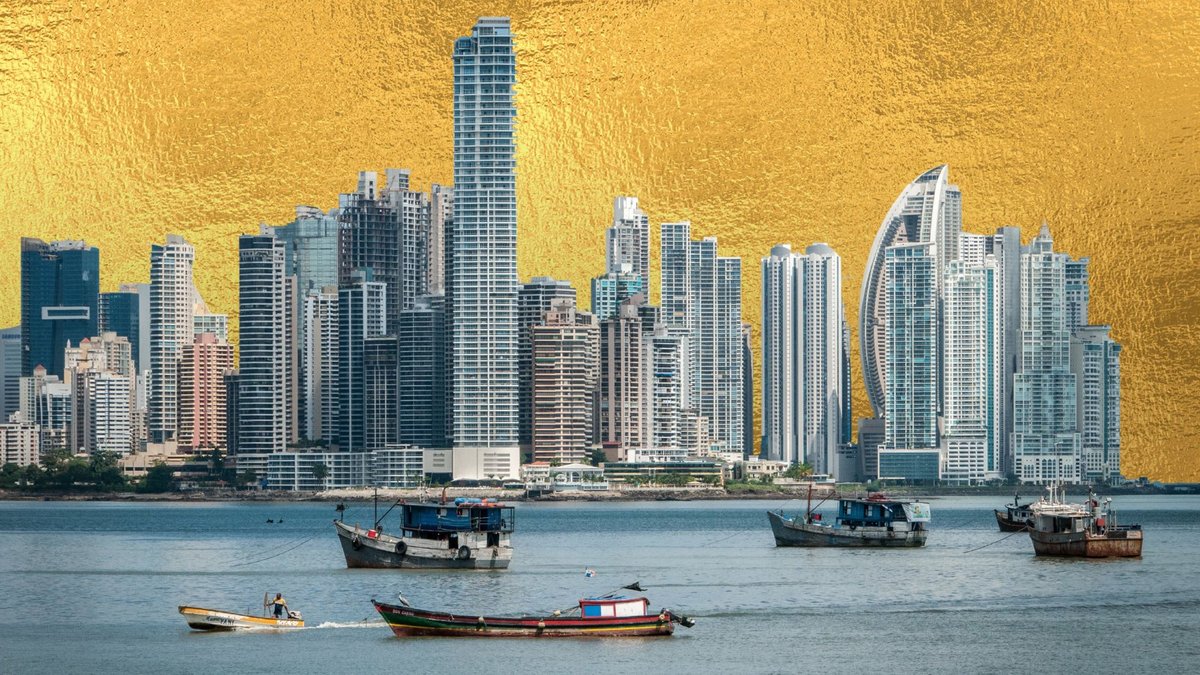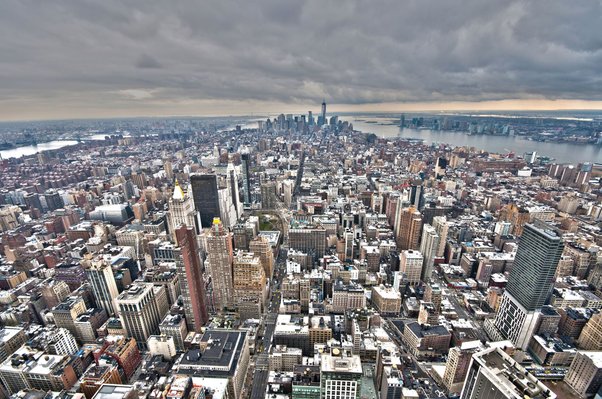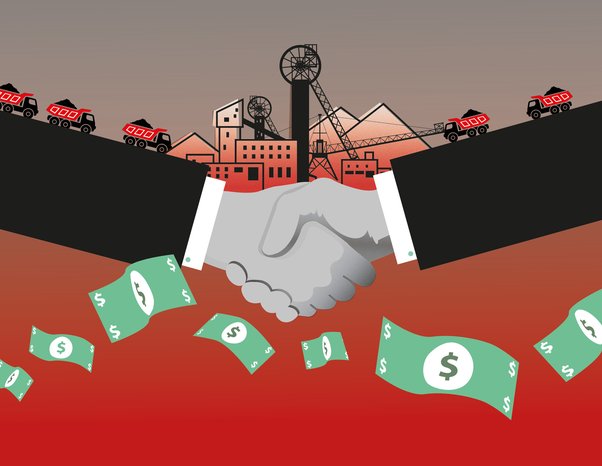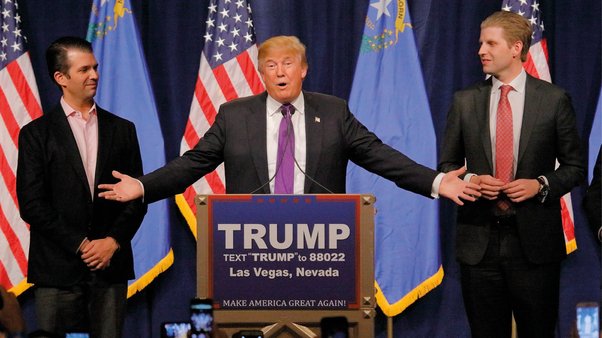Welcome to the Trump Ocean Club
Acknowledgements: The lead investigator on this Global Witness report was Ken Silverstein. Global Witness is grateful to NBC News for making available to us material from an NBC and Reuters interview with Alexandre Henrique Ventura Nogueira. Unless otherwise indicated, this material is referenced in the text as (NBC/Reuters).
Executive Summary
Every other country goes into these places and they do what they have to do … It’s a horrible law and [the Foreign Corrupt Practices Act] should be changed
In the early 2000s, a series of bankruptcies meant Donald J Trump was shunned by most lenders. Struggling for credit, he started selling his name to high-end real estate projects.
This report examines in detail the criminal connections that propelled one such project – the Trump Ocean Club International Hotel and Tower in Panama – and how this case bears some of the same disturbing hallmarks as other Trump developments.
Since he became President of the United States, numerous investigations and articles have probed Trump’s business dealings and his alleged links to criminals and other shadowy characters.
It is understood that Special Counsel Robert Mueller’s investigation under the Department of Justice will also examine his real estate business. This is important because it seems likely that, following his various bankruptcies, at least a part of Trump’s business empire has been built on untraceable funds, some apparently linked to Russian criminal networks.
Trump may not have deliberately set out to facilitate criminal activity in his business dealings. But, as this Global Witness investigation shows, licensing his brand to the luxurious Trump Ocean Club International Hotel and Tower in Panama aligned Trump’s financial interests with those of crooks looking to launder ill-gotten gains.
Trump seems to have done little to nothing to prevent this. What is clear is that proceeds from Colombian cartels’ narcotics trafficking were laundered through the Trump Ocean Club and that Donald Trump was one of the beneficiaries.
One key player in the laundering of drug money at the Trump Ocean Club was notorious fraudster David Eduardo Helmut Murcia Guzmán, whom a US court subsequently sentenced to nine years for laundering millions of dollars' worth of illicit funds, including narcotics proceeds, through companies and real estate.
Another was Murcia Guzmán’s business associate, Alexandre Henrique Ventura Nogueira, who brokered nearly a third of the 666 pre-construction unit sales at the Trump Ocean Club and claims to have sold 350-400 units overall.
Ventura Nogueira’s sales brokerage was critical to ensuring the project’s lift-off and Trump’s ability to earn tens of millions of dollars.
The warning signs were there from the outset. The Trump Ocean Club, one of Trump’s most lucrative licensing deals to date, was announced in 2006 and launched in 2011, a period when Panama was known as one of the best places in the world to launder money.
Whole neighborhoods in Panama City were taken over by organized crime groups, and luxury developments were built with the purpose of serving as money laundering vehicles.
Moreover, investing in luxury properties is a tried and trusted way for criminals to move tainted cash into the legitimate financial system, where they can spend it freely.
Once scrubbed clean in this way, vast profits from criminal activities like trafficking people and drugs, organized crime, and terrorism can find their way into the US and elsewhere. In most countries, regulation is notoriously lax in the real estate sector.
Cash payments are subject to hardly any scrutiny, giving opportunistic and unprincipled developers free rein to accept dirty money.
In the case of the Trump Ocean Club, accepting easy – and possibly dirty – money early on would have been in Trump’s interest; a certain volume of pre-construction sales was necessary to secure financing for the project, which stood to net him $75.4 million by the end of 2010.
Trump received a percentage of the financing he helped secure, and a cut on the sale of every unit at the development.
He and his family have made millions of dollars more from management fees and likely continue to profit from the Trump Ocean Club. Eager for the project’s success, Trump and his children have participated directly in marketing, management, and even project design.
According to broker Ventura Nogueira, Trump’s daughter Ivanka attended at least 10 meetings with him and project developer Roger Khafif.
A large number of those involved with the Trump Ocean Club in its early phase were Russian and Eastern European citizens or diaspora members.
In an interview with NBC and Reuters, Ventura Nogueira said that 50% of his buyers were Russian, and that some had “questionable backgrounds.”
He added that he found out later that some were part of the Russian Mafia.
Since the Russian government’s alleged interference in the 2016 election, a lot has been made of Trump’s heavy reliance on funds from Russia for his licensing deals.
Trump relying on funds from Russia is not in itself a problem – some of these funds are no doubt from legitimate sources. What is deeply problematic, however, is the fact that some of this money appears to have come from criminal networks.
Donald Trump has incessantly promoted himself as a successful and viable businessman, and this was critical to his success in the 2016 presidential election. But this report presents evidence that this façade was built, at least in part, on ventures used to launder cash generated by criminal activities.
Trump’s unscrupulous business dealings and blindness to potential illegality raise serious questions about his suitability to govern the most powerful country in the world.
The dubious dealings of Trump the businessman also raise questions about the commitment of Trump the President to tackling crime and corruption.
Trump got elected by repeatedly pledging to “drain the swamp,” but in the nine months since his inauguration he has actually taken steps that could worsen corruption in the US and internationally.
Indeed, one of his administration’s few legislative successes to date has been to overturn the implementing regulation of a ground-breaking anti-corruption law.
Money launderers making a splash
Global Witness has been exposing money laundering for almost a decade and has played a leading role in developing strategies to tackle it, such as the creation of public registries listing the true owners of companies.
Our investigations show just how damaging the laundering of dirty funds can be. Far from being a victimless crime, money laundering keeps poor countries poor, props up dictatorships and fuels corruption and criminality.
This report’s findings come as the laundering of money into the US is receiving increasing attention from law enforcement.
HSBC agreed to pay almost $2 billion in fines in 2012 for offences including the laundering of over $800 million from Mexican drug cartels. This laundering was so routine that criminals deposited the money in suitcases designed to fit exactly the tellers’ windows in HSBC’s Mexican branches.
Meanwhile there are several international law enforcement investigations, including by the Federal Bureau of Investigation, into the looting of billions of dollars from 1 Malaysian Development Berhad (1MDB), Malaysia’s sovereign wealth fund.
Some of this money was used to buy works of art, including a Van Gogh and a Monet, high-end real estate in New York and, ironically, to bankroll the Hollywood blockbuster The Wolf of Wall Street.
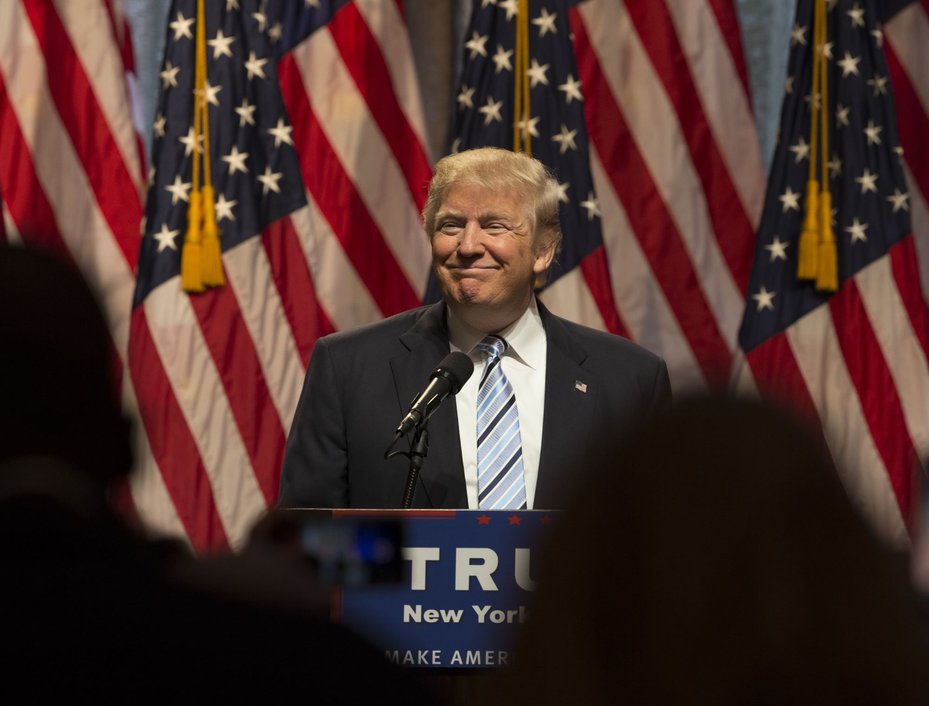
We call on appropriate law enforcement authorities, including Special Counsel Robert Mueller and Congress, to investigate these allegations and, if appropriate, hold President Trump accountable for his actions. Lev Radin / Shutterstock
The solutions to the problems set out in this report are clear:
- Appropriate law enforcement authorities, including Special Counsel Robert Mueller, should investigate these allegations and, if appropriate, hold President Trump accountable for his actions. The congressional committees looking into this issue should likewise investigate these allegations and, if appropriate, hold President Trump accountable for his actions.
- Every country should require all companies and trusts to disclose who ultimately owns and controls them and make this information public.
- Every country should require the real estate sector to know who their clients are and the source of their funds as a precaution to ensure that dirty money is not being laundered into the property market.
- Every country should require lawyers who carry out transactions for their clients, including the buying and selling of real estate and the creation of companies, to know who their clients are and the source of their funds.
We have approached all the subjects of this report for their comments and have included those responses we had received at point of publication.
Share information with Global Witness
If you have any information relating to the subjects and issues profiled in this report that you would like to share with Global Witness, please send a PGP encrypted email to [email protected] using this public key.
For information on how to use PGP encryption please consult Tactical Tech’s Security in a Box for Windows and Mac.
The Trump way
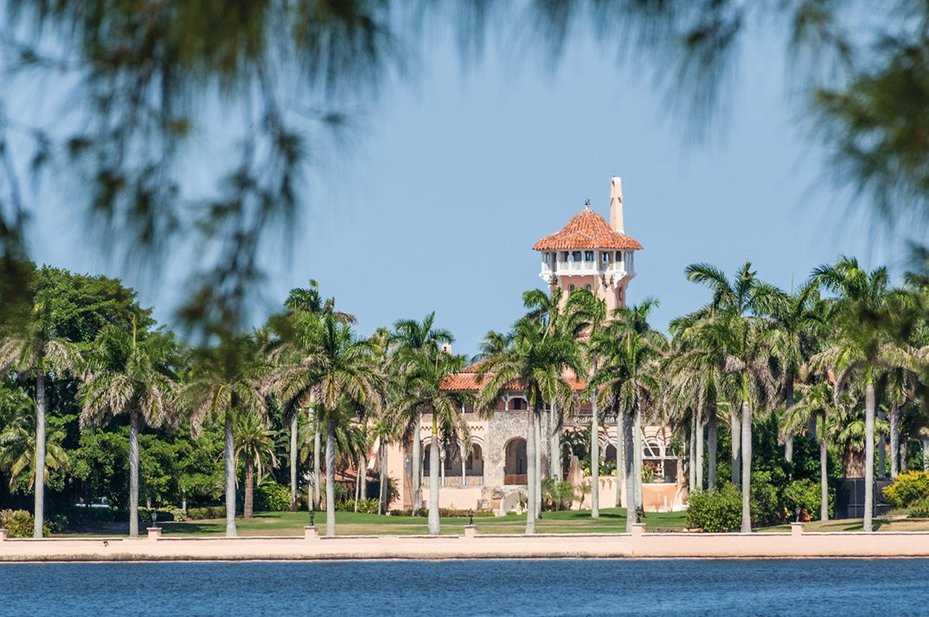
Trump hosted a party at Mar-a-Lago in January 2008 to promote a new Panamanian real estate project, one of his most lucrative branding deals. Allen Creative / Steve Allen / Alamy Stock Photo
Licensing the Trump way
Head for money laundering hotspots and ask few questions
In January 2008, Donald Trump hosted a party at his Mar-a-Lago estate in Palm Beach, Florida to promote a gigantic Panamanian real estate project then under construction.
Trump had much to celebrate that night. The Trump Ocean Club International Hotel and Tower (TOC), featuring residential condominiums, a hotel, restaurants and an office tower, was the businessman’s first international development.
It was also one of the most lucrative branding deals of his career.
This was quite a turnaround. Back in 2004, Trump's real estate empire had seemed close to collapse after five bankruptcies in 14 years left his organization with an accumulated debt of almost $2 billion.
This left him virtually cut off from commercial loans. Trump relaunched his career with a business model based largely on self-promotion.
He started selling his name to luxury real estate projects, leveraging the Trump brand in lucrative deals that often involved minimal investment on his part and little risk if the project tanked.
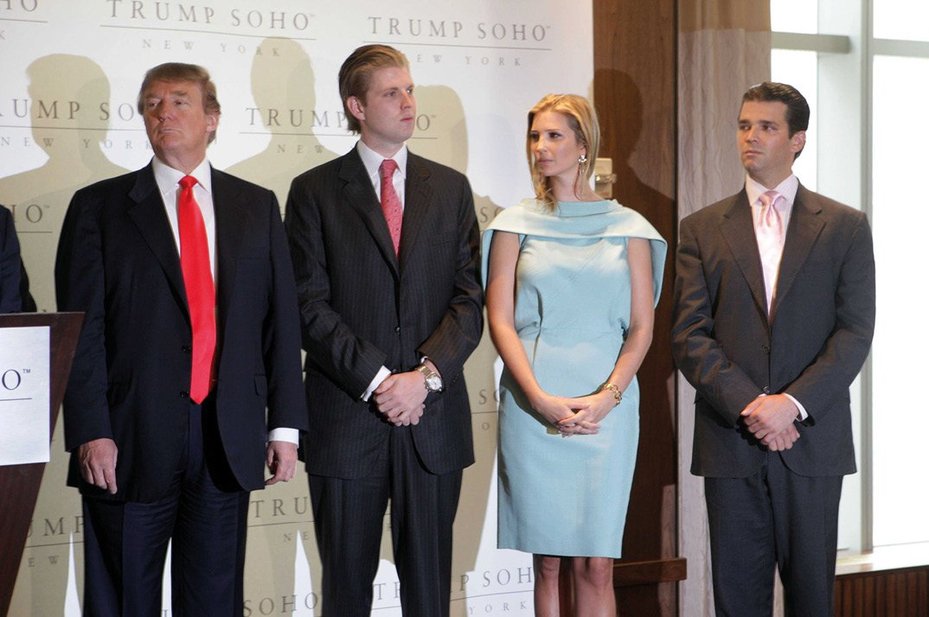
Following his fifth bankruptcy, Trump re-launched his career with a business model based largely on self-promotion. Sipa Press / REX / Shutterstock
Many of Trump’s licensing arrangements bear similar concerning hallmarks. These include partnerships and associations with questionable or even criminal figures with shadowy connections.
Some developments have been financed through illicit funds or unidentifiable buyers who cover their tracks with layers of shell companies.
Some projects have gone bust amid lawsuits and disputes between developers, owners or tenants.
Trump has frequently come out on top even when others have lost out.
It is against this backdrop that this report examines the case of the Trump Ocean Club in Panama – a development that vividly illustrates the 45th president’s appetite for risky business.
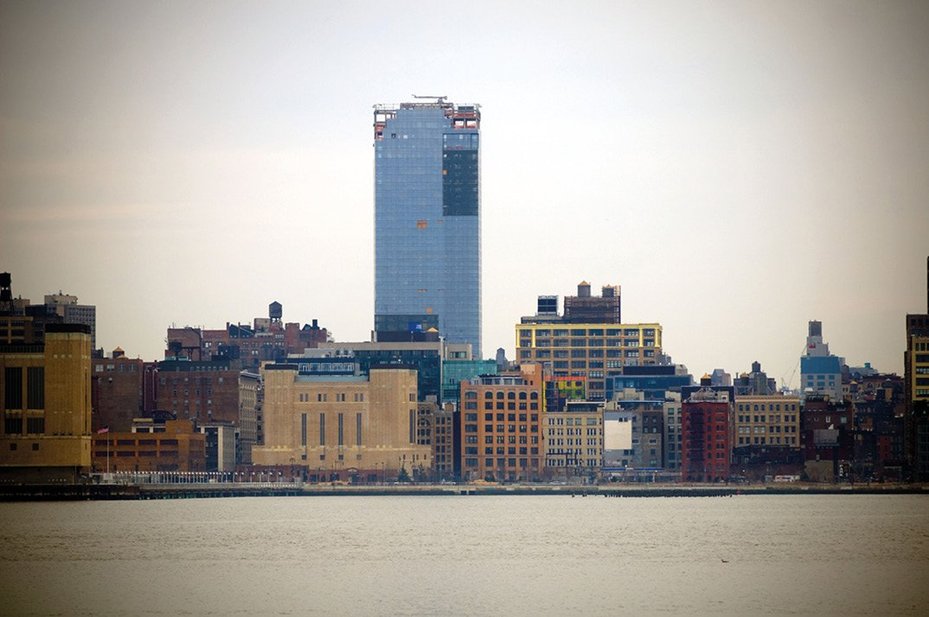
The Trump SoHo is perhaps the most widely-documented case of Trump doing business with dubious and sometimes criminal characters. Richard Levine / Alamy Stock Photo
Trump SoHo New York
New York’s Trump SoHo is a well-documented case of Donald Trump dealing with dubious or even criminal characters and benefiting from anonymously sourced funds.
The project involved Trump entering into a licensing deal with real estate companies Bayrock Group and the Sapir Organization to develop a 46-story tower in New York City’s prestigious SoHo neighborhood.
Trump championed the development with his daughter Ivanka and son Donald Jr. Like many of his projects, it was destined to fail, and the development changed hands in a foreclosure sale in 2014.
Reports suggest that Bayrock had several links to organized crime. The company was said to have an association with Viktor Khrapunov, former energy minister of Kazakhstan and ex-mayor of the capital, Almaty.
The city of Almaty filed a federal lawsuit against Khrapunov in 2014, accusing him of looting hundreds of millions of dollars of public assets.
He has said all of his family’s wealth has been lawfully made and that the lawsuit is politically motivated.
The Financial Times has linked this money to the purchase of units by shell companies at the Trump SoHo.
Bayrock’s managing director was Felix Sater. Sater is a Russian-born US citizen who was convicted of fraud and has been accused of having links with the Mafia, something that he has denied.
Sater has described himself as a senior advisor to Donald Trump. He claimed that he had an office down the hall from the Trump family and carried a Trump Organization business card.
In 2013, however, Trump said, “I don’t think he was connected to the Mafia and I don’t know him very well.” Trump added: “If he were sitting in the room right now, I really wouldn’t know what he looked like.”
Sater is described in media reports as a confidential informant for the Federal Bureau of Investigation.
Some analysts suggest that he may be providing information to Robert Mueller’s investigation into Trump’s alleged ties with Russia.
In an interview with the Financial Times, Alan Garten, executive vice president and chief legal officer of the Trump Organization, said Bayrock and the Sapir Organization were responsible for apartment sales and for conducting due diligence on buyers.
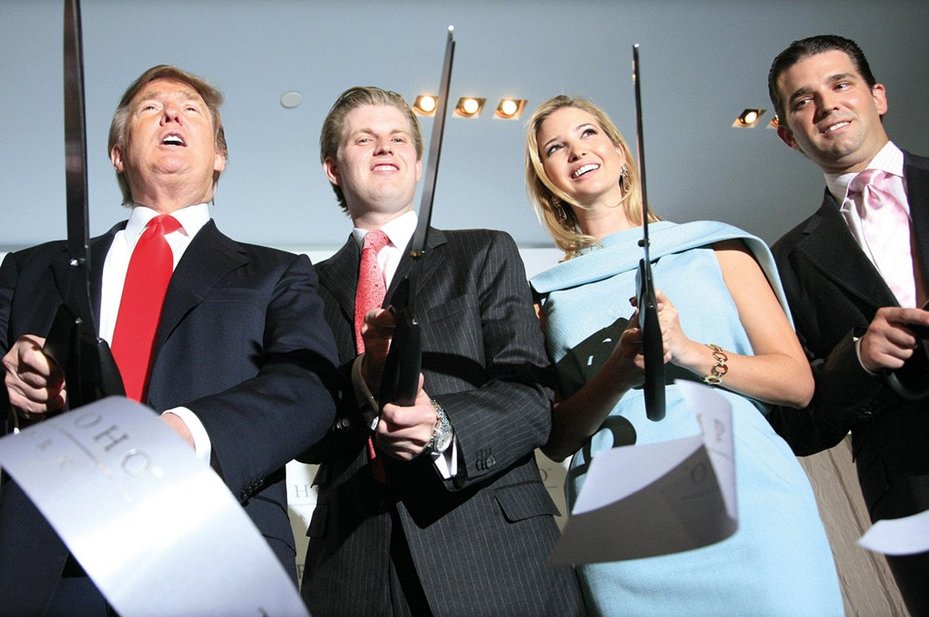
Trump championed the Trump SoHo development with his daughter Ivanka and son Donald Jr. Mark Lennihan / AP Photo
Trump International Hotel and Tower Baku, Azerbaijan
As reported by the New Yorker, in 2012 the Trump Organization signed a licensing deal to develop the Trump International Hotel and Tower Baku, Azerbaijan.
The developer was Garant Holdings, a company headed by Anar Mammadov, son of the then-Transportation Minister Ziya Mammadov.
Ziya Mammadov in turn has close ties to the Darvishi family, whose members headed firms reportedly controlled by the Iranian Revolutionary Guard.
The US government accuses Revolutionary Guard-controlled companies of sponsoring terrorism abroad and engaging in illicit activity, including drug trafficking and money laundering.
The source of Garant Holdings’ funds has not been made public.
The New Yorker reported that the Trump family was involved in the development, with Ivanka taking particular interest in the interior design of the project.
Expert opinion cited in the article suggested that the Trump Organization should have been aware that a multi-million dollar development funded by the inexperienced son of an Azerbaijani government minister was likely to be corrupt.
The Mammadovs were politically exposed persons (PEPs) as defined by the Financial Action Task Force (FATF).
Moreover, Azerbaijan has been described by the US State Department as being surrounded with “… corruption and predatory behavior by politically-connected elites.”
The project was eventually abandoned by the Trump Organization in 2016 after Donald Trump was elected president – but not before Trump walked away reportedly $2.8 million richer.
Responding to questions from the New Yorker, Alan Garten told reporters that Trump only played a passive role in the project and had never engaged with Ziya Mammadov.
This narrative of plausible deniability re-occurs across Trump’s projects.
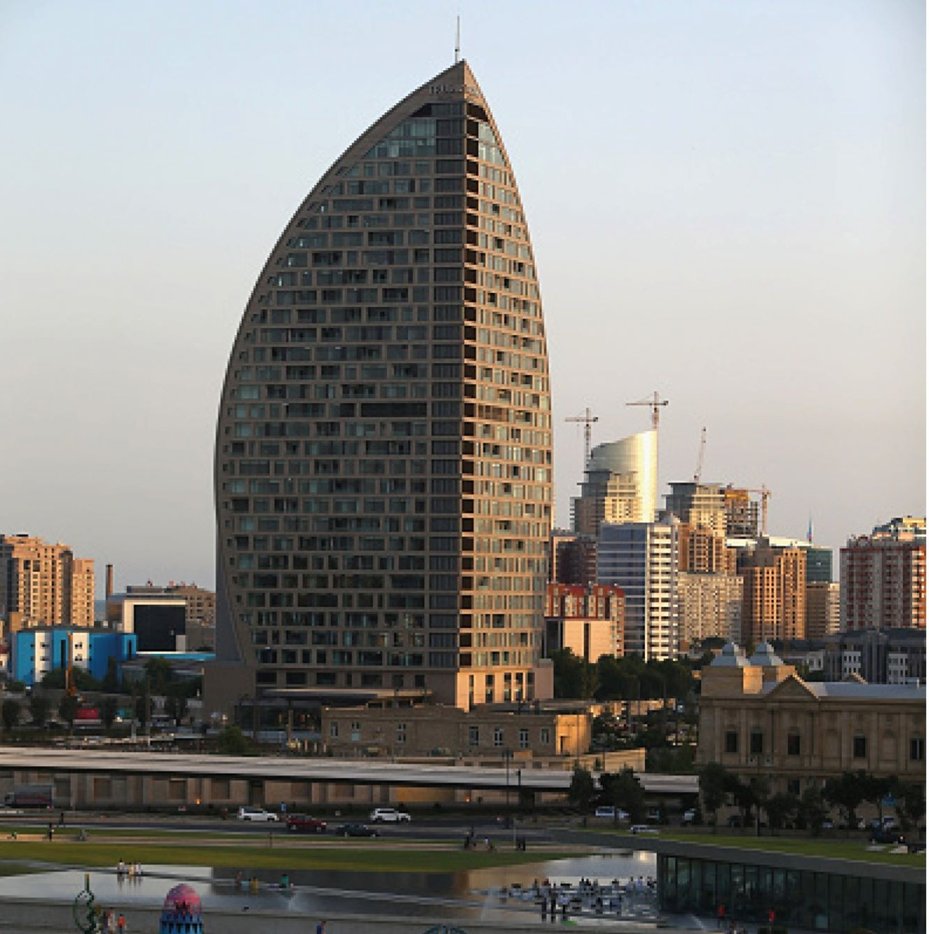
In 2012, as reported by the New Yorker, the Trump Organization signed a licensing deal for a development in Baku, Azerbaijan. Michael Steele / Getty Images for BEGOC
The Trumps go to Panama
The Art of the Deal
In 2005, Panamanian businessman Roger Khafif and his partners were pondering how to breathe life into their plans for a luxury condominium in Panama.
By early 2006 they had set up a company – Newland International Properties, Corp. (Newland) – to build it.
Now Khafif needed a "name" – someone to draw in the big spenders to buy up the unbuilt units and provide the funds to lift the project off the drawing board.
Struggling financially at this time, Donald Trump seized the chance to be that name, and to embark on his very first international licensing venture.
He struck a deal with Khafif, and the Trump Ocean Club (TOC) was announced in New York City on April 24, 2006.
The announcement was followed by a pre-construction sales period that ran to 30 June 2007.
This was the critical window during which the project developers needed to demonstrate sufficient funds to attract significant outside financing to build the TOC.
Trump, Newland, International Sales Group Latin America Ltd. – the master brokerage firm hired to represent the developers – as well as a number of real estate brokers, duly embarked on an energetic global marketing campaign to rustle up buyers.
This presented opportunities to legitimate investors. However, as we will see, it also opened the project up to the risk of money launderers using it to scrub clean their ill-gotten gains.
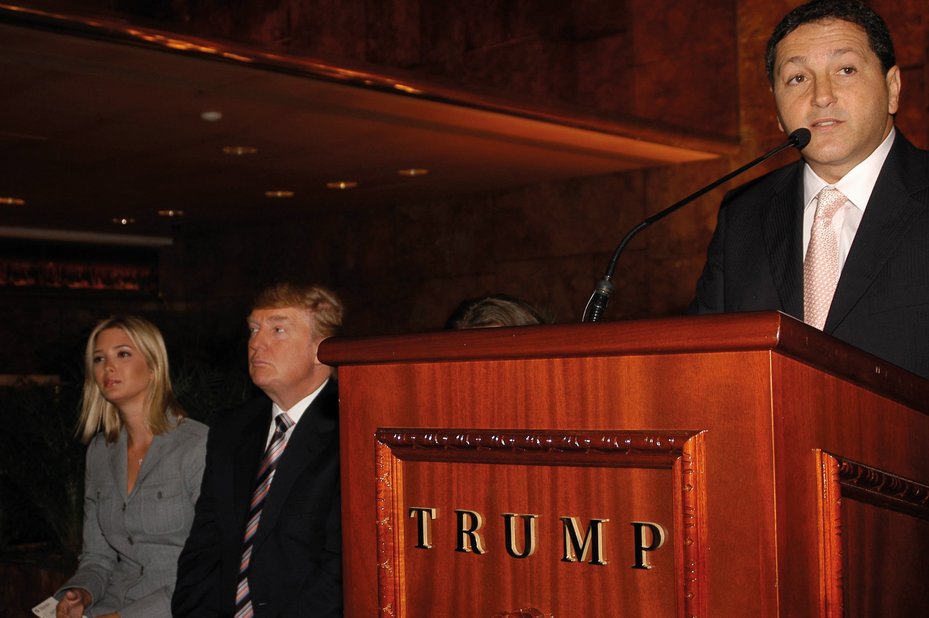
Panamanian businessman Roger Khafif struck a deal to license the Trump name at The Trump Ocean Club, announced in New York City in April 2006. Matt Carasella / Patrick McMullan / Getty
But what was in it for Trump? There is little transparency around Trump’s financial agreement with Newland, a company that filed for bankruptcy in 2013.
In fact, according to Univision News’ reporting of a New York court’s hearing on the bankruptcy, Newland refused to turn over the agreement with Trump to license his name.
This prompted the judge to say to Newland’s attorney: “Go to Panama. If you want to do your deals in secret, go and do it in Panama. Don't do it in my court.”
What we do know is that the deal was very lucrative. Trump was entitled to an upfront $1.2 million licensing fee and 1% of any financing he helped to secure.
Moreover, the Newland bonds sales prospectus shows that the Trump Organization was in line for a cut of every unit sold.
Overall, Trump stood to gain $75.4 million from the TOC by the end of 2010.
These earnings were heavily predicated on the success of the pre-construction sales period, which was the key to securing big ticket outside financing.
As of June 30, 2007, two-thirds of the TOC's 996 residential and commercial units had been sold for a combined total of $279 million.
Alexandre Henrique Ventura Nogueira, a key broker of TOC purchases, described in an interview with NBC and Reuters how he sold 100 units in just a week and how using the Trump name enabled him to sell for five or six times the price of comparable units in Panama.
It was thanks to these sales that Bear Stearns – the Wall Street giant whose collapse less than a year later triggered the global economic meltdown – underwrote a $220 million bond issue that would raise funds for the TOC’s construction.
A green light for construction also opened the door to a continued stream of profits for Trump over the long-run.
Beyond drawing a substantial income from the TOC, Trump and his children played an important role in marketing the development. They also managed the property after its completion.
Although they had no role in selling the units, a task handled by brokers and others, the Trumps appeared at various events to promote the TOC.
The Trump Organization was even listed, however inaccurately, as a “developer” in marketing materials, with Trump himself boasting, “I am proud to develop this extraordinary high rise.”
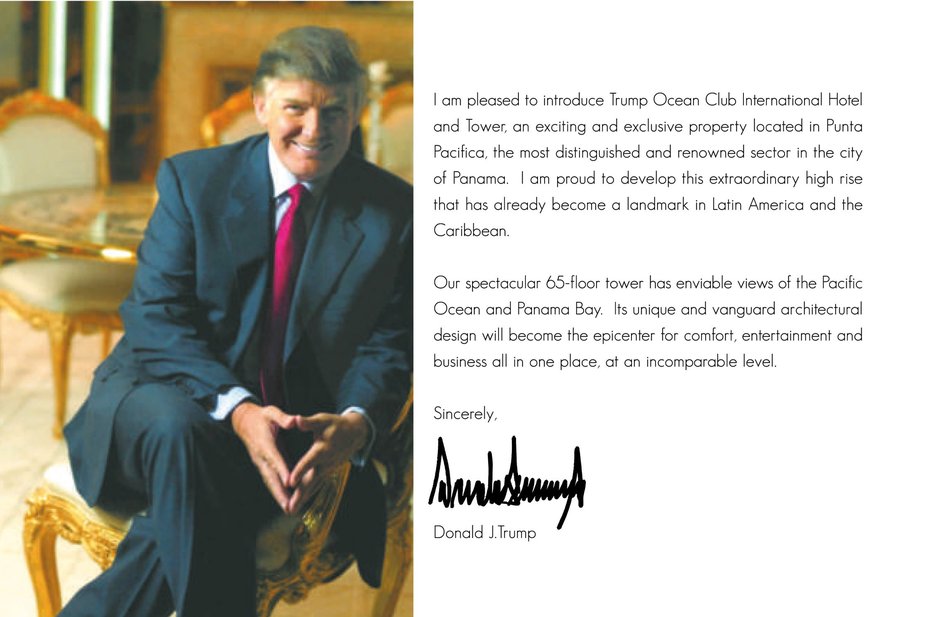
The Trump Organization worked to promote the project and in this marketing brochure for the TOC Trump himself boasted: “I am proud to develop this extraordinary high rise”.Trump Ocean Club
Ivanka's "baby"
According to Trump Ocean Club developer Roger Khafif, Ivanka Trump was just getting established in the Trump Organization at the time the TOC was launched, and her father wanted the project to be Ivanka’s “baby.”
Both Eric and Ivanka Trump went to Panama at least four or five times to promote the development, and conducted quality control and site inspections, according to a broker who worked for a real estate company doing business at the TOC at that time.
They attended marketing parties for the TOC, and Ivanka met with project brokers.
Real estate broker Alexandre Henrique Ventura Nogueira has described Ivanka Trump as being ultimately responsible for all aspects of the TOC licensing deal for the Trump Organization and says that he met her at least 10 times.
One of these meetings involved flying with Ivanka and Roger Khafif on a private jet to review a potential real estate project in Colombia. (NBC/Reuters)
Ventura Nogueira claims that, in his first meeting with Ivanka, he persuaded her and Roger Khafif to give him the go ahead to sell 100 TOC units in one week.
According to Ventura Nogueira he met his target, dealing units at exorbitant prices inflated by the value attached to the Trump name. (NBC/Reuters)
Ventura Nogueira suggested to NBC and Reuters that Ivanka knew he was selling a lot of TOC units to Russian buyers.
At another point in the same interview he asked, “Did the Trump Organization know there were some Russians there with strange backgrounds involved in buying? I don’t know.”
This signposts the key question now facing Ivanka Trump, as well as her father: what checks did they do on the brokers and buyers to ensure that the development that bore their name was not being used to launder the proceeds of crime?
The evidence suggests that the answer is very little or nothing at all.
We put this question to Ivanka Trump, Donald Trump and the Trump Organization. At the time of publication, they had not responded.
Investor spotlight: David Helmut Murcia Guzmán
Money launderer Murcia Guzmán checks into the Trump Ocean Club
David Helmut Murcia Guzmán is a Colombian fraudster and money launderer with reported ties to armed groups.
He ran a profitable pyramid scheme in Colombia named after his initials, DMG Group (DMG), and was a magnet for illicit funds.
According to the US Attorney for the Southern District of New York, “Murcia Guzmán … laundered narcotics proceeds through DMG and DMG's affiliated companies” and “wove an intricate web of deception across continents to disguise his dirty drug money and support his lavish lifestyle.”
Colombian media coverage describes a police raid netting evidence that a member of rebel group Fuerzas Armadas Revolucionarias de Colombia (FARC) invested in DMG.
Press reports also allege that Murcia Guzmán moved money for the paramilitary organization Autodefensas Unidas de Colombia (AUC).
At the time, both FARC and AUC were designated by the US as terrorist organizations.
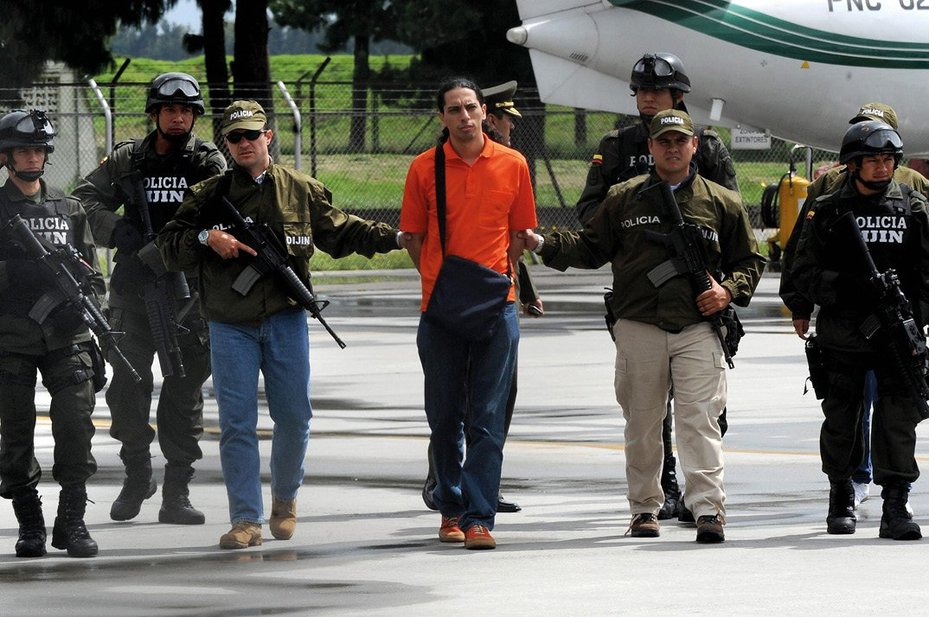
Interviews conducted by Global Witness reveal that David Helmut Murcia Guzmán, Colombian fraudster and money launderer, invested in a number of units at the TOC. Mauricio Duenas / AFP / Getty
Interviews conducted by Global Witness reveal that Murcia Guzmán invested in a number of units at the TOC during the pre-construction sales period and that this was arranged for him by Ventura Nogueira.
Ventura Nogueira confirmed this in his interview with NBC and Reuters but seemed reticent in describing his role, saying he purchased a “maximum 10 units” for Murcia Guzmán.
According to Murcia Guzmán’s lawyer in Panama, Roniel Ortiz, Murcia Guzmán purchased TOC units in cash brought into the country by “mules” from Colombia.
Monte Friesner, a convicted money launderer and former Central Intelligence Agency contractor who now advises clients on money laundering risks, also told Global Witness about Murcia Guzmán covertly moving cash into Panama.
Friesner, who was based in Panama at the time and knew Murcia Guzmán, described him as being in the “boat business”.
He said that Murcia Guzmán brought sealed bags of cash from Colombia into Panama in customized vessels equipped with lead-lined holding tanks.
These boats arrived in Panama once a week and sometimes went on to Miami for repairs with bags of money still stashed on board.
In his interview with NBC and Reuters, Ventura Nogueira denied that his buyers made any TOC purchases in cash except for deposits of a few thousand dollars.
On 17 November, 2008, the Colombian authorities raided sixty DMG offices in 20 Colombian cities and ordered the company be shut down, on the basis that it was a pyramid scheme and a money laundering operation to boot.
Colombia’s attorney general said that DMG was run with “resources of illicit origin.”
Colombian President Alvaro Uribe gave a television interview in which he accused DMG of “money laundering in relation to drug trafficking.”
By the end of November, Murcia Guzmán had been arrested in Panama and his pyramid scheme immediately collapsed, sparking protests across Colombia.
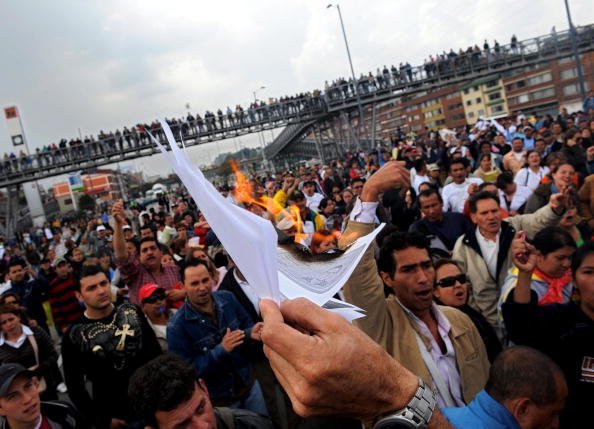
The collapse of Murcia Guzmán’s pyramid scheme after his arrest in Panama sparked protests by investors across Colombia. Murcia Guzmán has recently completed a nine-year sentence in a US prison and may now be extradited back to Colombia to serve a furth. Mauricio Duenas / AFP / Getty
Murcia Guzmán was subsequently extradited to the US, where he pled guilty to conspiracy to launder the proceeds of narcotics trafficking, including through US real estate.
He has recently completed a nine-year sentence in a US prison, and is currently in a US immigration detention facility awaiting extradition to Colombia.
There he is expected to serve a further 23 years for fraud and money laundering.
What to make of all of this? We know that David Murcia Guzmán laundered millions of dollars of drug money, including – as a US court has found – through real estate. We also know that he purchased TOC units.
In addition, well-placed sources indicate that he used cash trafficked from Colombia to carry out business transactions in Panama.
On this basis, Global Witness concludes that Murcia Guzmán’s investment in the TOC laundered the proceeds of narcotics trafficking, and that Donald Trump was one of the beneficiaries.
If Trump – who as licensor was almost certainly entitled to call for sales information – did any checks into the buyers of TOC units, he either failed to pick up the Murcia Guzmán connection or declined to act on it.
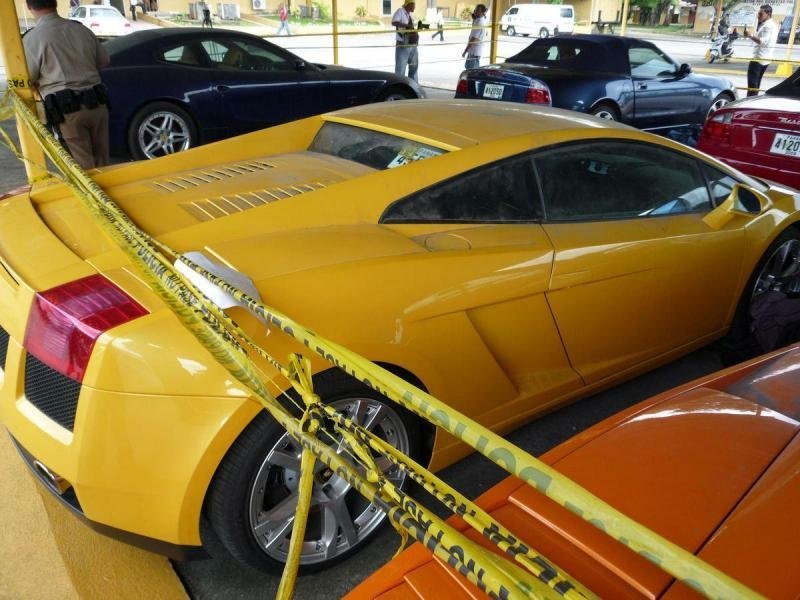
Murcia Guzmán was known as a man about town. His collection of luxury cars was seized by law enforcement following his legal troubles. Ed Grimaldo / La Estrella
Shortly before he completed his jail sentence in the US, Global Witness wrote to David Murcia Guzmán to ask for his comment on the allegations made in this report that relate to him.
Responding on his behalf, the director of “the international campaign to Free David Murcia” replied with the following:
“David Murcia Guzmán is currently at the Moshannon Correctional Center in Pennsylvania. He has received an email from you that contains a questionnaire which you plan to make public.
"Entrepreneur David Murcia Guzmán wishes to communicate to you that more than 99% of this questionnaire does not contain real or true facts … The entrepreneur has had his human rights violated both nationally and internationally.
"This means that he requires the help of a serious entity like you to let the truth about the violation of national and international rights be known.”
Meet the brokers
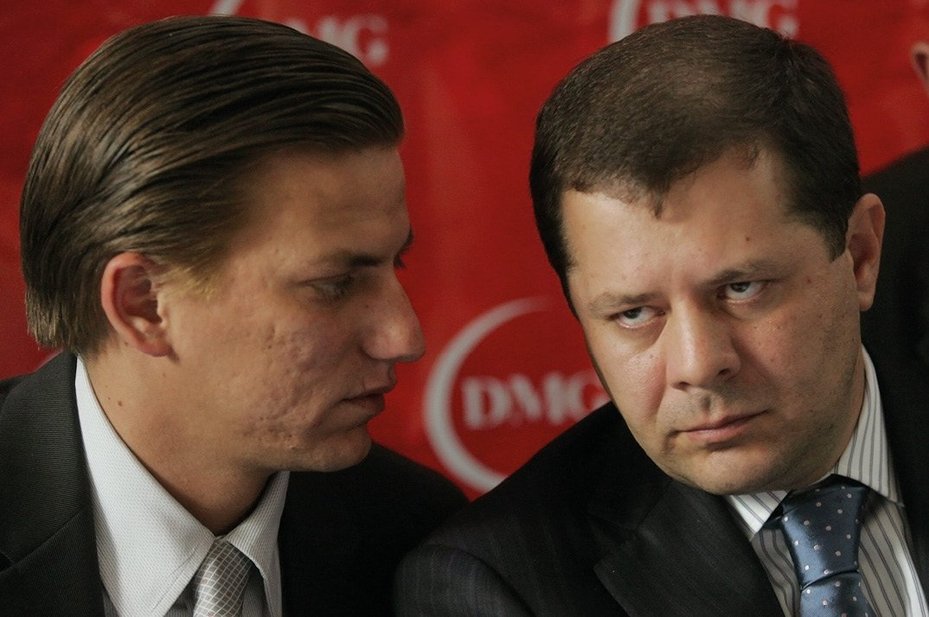
At a 2008 press conference, Ventura Nogueira and his partner Alexander Altshoul said they held the rights to expand the DMG company into Panama and Brazil.EFE/Agencia EFE
Murcia’s man in Panama
The Trump Ocean Club’s top broker
Alexandre Henrique Ventura Nogueira, a Brazilian-born real estate broker and head of a group of companies called Homes, became involved in the TOC development in the pre-construction phase.
He quickly established himself as a key broker of the sales needed to float the project. As we have seen, he arranged unit purchases for David Murcia Guzmán that brought drug money into the TOC. He would go on to become Murcia Guzmán’s business partner.
Ventura Nogueira knew Roger Khafif before the TOC and had worked with him on an unrelated project. He and Khafif worked out of the same building in Panama that housed Newland, Homes and the TOC sales office. Once the TOC project was announced, Ventura Nogueira persuaded Khafif that they should name the office block “Trump Plaza”. (NBC/Reuters)
Some observers told Global Witness that Ventura Nogueira and his associates acted as if they were affiliated with the TOC, although Roger Khafif stated that they were not.
In his interview with NBC and Reuters, Ventura Nogueira described how he imported the first ever limousine in Panama and had the Trump logo emblazoned on its doors to impress potential customers.
He also said that he used the Trump logo on a helicopter used to fly visitors around Panama.
Ventura Nogueira was crucial to the TOC racking up enough pre-construction sales to trigger the major league financing that paved the way for Trump to earn tens of millions of dollars.
Roger Khafif describes how buyers of approximately 200 TOC units were represented by a network of individuals working under Ventura Nogueira and his eight Homes group companies (the "Ventura Nogueira Network").
Based on these figures, Ventura Nogueira and his network would have accounted for nearly a third of the 666 pre-construction unit sales at the TOC. Ventura Nogueira himself estimates that, overall, he brokered the purchase of 350 to 400 TOC units.
Ventura Nogueira was such an important figure that he and his family were guests at Trump’s Mar-a-Lago party in January 2008, along with brokers in his network. In his interview with NBC and Reuters, Ventura Nogueira describes briefly meeting Donald Trump at Mar-a-Lago and Trump praising his success in selling TOC units.
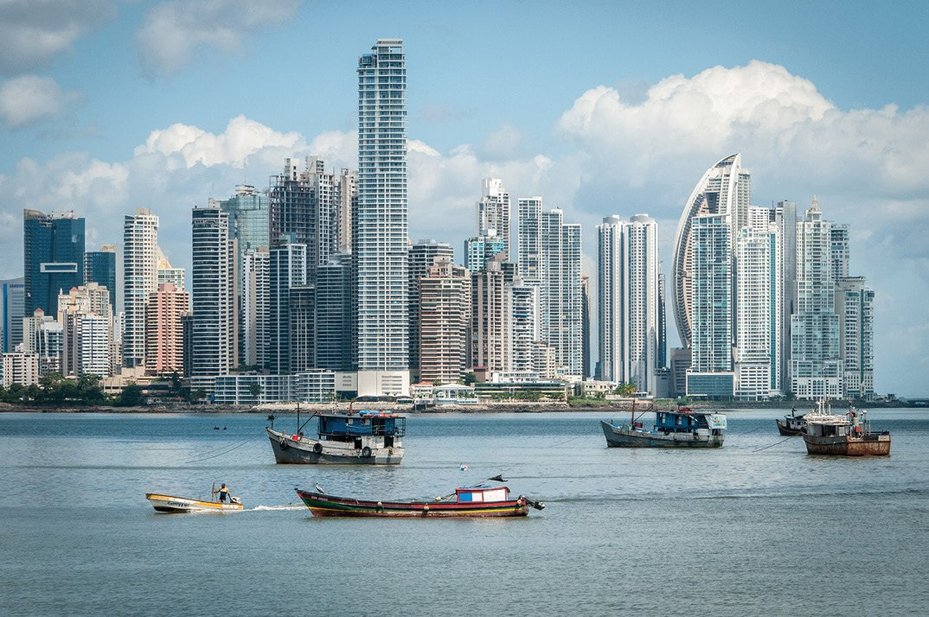
Weak laws, regulations and enforcement on real estate transactions allowed dirty money into Panamanian luxury properties. Sergi Reboredo / VW PICS / UIG via Getty Images
Ventura Nogueira’s fleet of "Special Purpose Vehicles"
During the 12 months before the Bear Stearns bond issuance that enabled construction of the Trump Ocean Club to proceed, Ventura Nogueira and the eight Homes companies’ directors, officers, agents, subscribers and employees created 119 companies known as "special purpose vehicles" (SPVs).
Ventura Nogueira himself was listed as an officer in nearly half of them.
Ventura Nogueira, in his interview with NBC and Reuters, described how setting up of anonymous offshore companies was part of a package of services he offered. He explained how buyers would purchase a TOC unit by buying a company that he and one of his lawyers had set up specifically for that purpose.
Company and officer data concerning SPVs associated with Trump Ocean Club units was extracted from OpenCorporates.com and verified in the original Panamanian company registry.
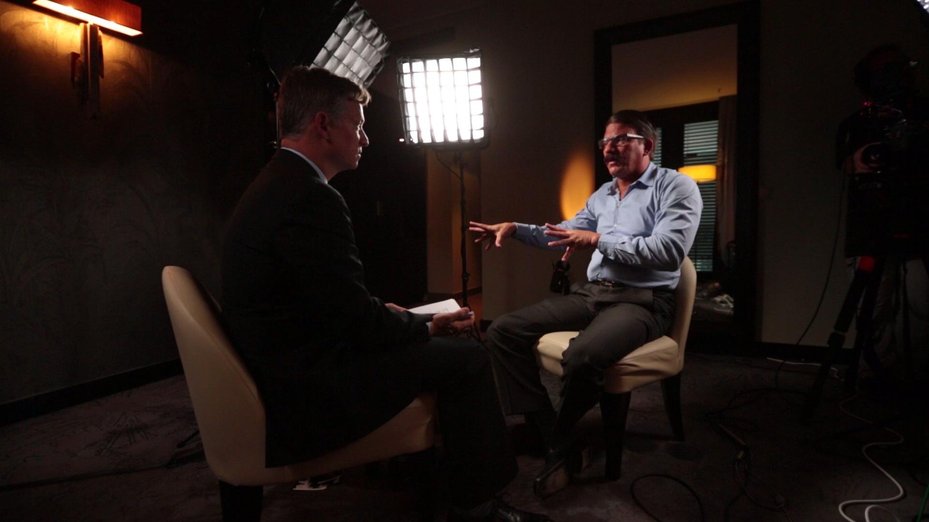
In his interview with NBC and Reuters, Ventura Nogueria described how setting up anonymous offshore companies was part of a package of services he offered for the buyers of TOC units.NBC News
Ventura Nogueira’s association with David Murcia Guzmán surfaced publicly the day after the Colombian authorities began their crackdown on Murcia Guzmán’s DMG business. On 18 November, 2008 Ventura Nogueira and his partner Alexander Altshoul were unveiled as Murcia Guzmán’s new business associates outside of Colombia.
They held a press conference alongside lawyers for the DMG group, defending the company’s basic business model – which involved credit card payments for later purchases in DMG stores – and saying there was nothing illegal about it.
Ventura Nogueira and Altshoul said they had bought the franchise to expand DMG into Panama and Brazil, and had lined up $250 million of investments into that part of the business. Altshoul said there was a further ten year $1 billion plan to expand DMG still further afield and that DMG planned a stock market listing.
In November 2009, the Colombian newspaper La Semana reported that Ventura Nogueira was heading a new organization called “the DMG Foundation – Friends of David Murcia Guzmán.”
The organization’s purpose was said to be paying for the defense of Murcia Guzmán, covering DMG’s debts, and carrying on Murcia Guzmán’s "social work."
Ventura Nogueira continued to tell reporters of his plans to expand DMG internationally, including in Brazil, Chile and Mexico.
He also said that he would reopen DMG offices that were shut down by the authorities in Ecuador and Venezuela.
Aside from dealings on behalf of Murcia Guzmán, it is likely that the Ventura Nogueira network facilitated other purchases of TOC units that helped launder the proceeds of criminal activities.
As we will see, Ventura Nogueira, one of his partners, and at least five top Homes representatives, played important roles in marketing TOC units during the pre-construction sales period to Russian and Eastern European buyers. This came at a time when Russian organized crime was making its presence felt in Panama.
Moreover, in his interview with NBC and Reuters, Ventura Nogueira admitted taking part in money laundering activities in Panama, although he denied that any of these occurred in connection with his brokering of sales of TOC units.
Any suspicions that Trump and others involved in the TOC had about the identities of early buyers and the sources of their money should have been magnified by Panama’s international notoriety as a dream destination for dirty cash.
Panama: A hotspot for illicit financial activity
Weak laws, regulations and enforcement on real estate transactions allowed dirty money to pour into Panamanian luxury properties. Miguel Antonio Bernal, a lawyer and law professor at the University of Panama, told Global Witness that “at least 95%” of luxury buildings built in Panama in the last 25 years were financed with corrupt money.
A series of US diplomatic cables described how gangsters, drug cartels and tax evaders used shell companies to hide their investments in luxury real estate.
One of the cables – written six weeks after Trump and his partner Roger Khafif announced the TOC project and later made public by WikiLeaks – found that “‘No questions asked’ seemed to be the rule. Businessmen, lawyers, bankers, and public servants of all levels are willing ‘to help,’ for the right price.”
The Russian connection
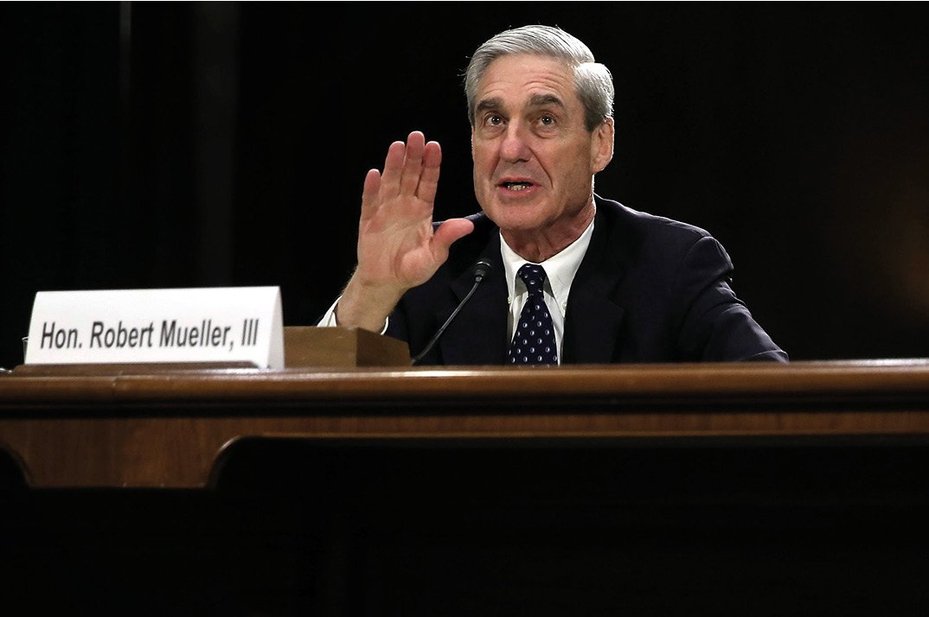
Special Counsel Robert Mueller recently broadened the focus of his investigation to include Russian purchases of, and investment in, Trump properties going back at least a decade. Alex Wong / Getty Images
Attracting Russian and Eastern European buyers was a key part of the effort to get the TOC afloat but it posed major money laundering risks.
In his interview with NBC and Reuters, Ventura Nogueira stated that 50 percent of his customers were Russian, and that “I had some customers with some, you know, questionable backgrounds.” He also said that he found out later that some customers were part of the Russian Mafia.
Another real estate broker who worked in Panama during the TOC pre-construction sales period told Global Witness that Eastern European and Russian investors at the TOC were “very secretive”, especially when setting up shell corporations, so you “don’t know their names” and “didn’t know where their money came from.”
Rich Russians – whom he called “the whales” – were prized clients because brokers could earn substantial commissions working with them. These were exactly the kind of purchasers needed by Trump and others to secure early sales, and therefore the financing through Bear Stearns to develop the project.
In his other real estate ventures, Trump has emphasized the importance of Russian buyers. According to Russian media, Trump brought a group of journalists to New York from Moscow in 2008 to visit Trump SoHo, then in construction.
At a press conference with the journalists, as reported in Russia’s Seagull magazine, Trump said “I have very good business relations with the Russians.”
A Russian recently bought a house in Florida for $100 million. Some Russians buy houses at 50 million each. Great buyers!
The magazine paraphrased Trump representatives as saying that Russians were the best buyers of real estate as they could buy apartments for cash, without needing mortgage loans.
Eric Trump was interviewed in another Russian publication saying: “In the New York hotel-condominium Trump SoHo the bulk of buyers are foreigners, among whom there are a lot of Russians.”
ABC News later quoted Alan Garten saying that Russians did not spend any more on Trump-related properties than investors from elsewhere. He also said the Trump Organization did not fly in Russian journalists.
“If such a trip took place it would have likely been arranged by the developer or the broker for the project – not us,” he said.
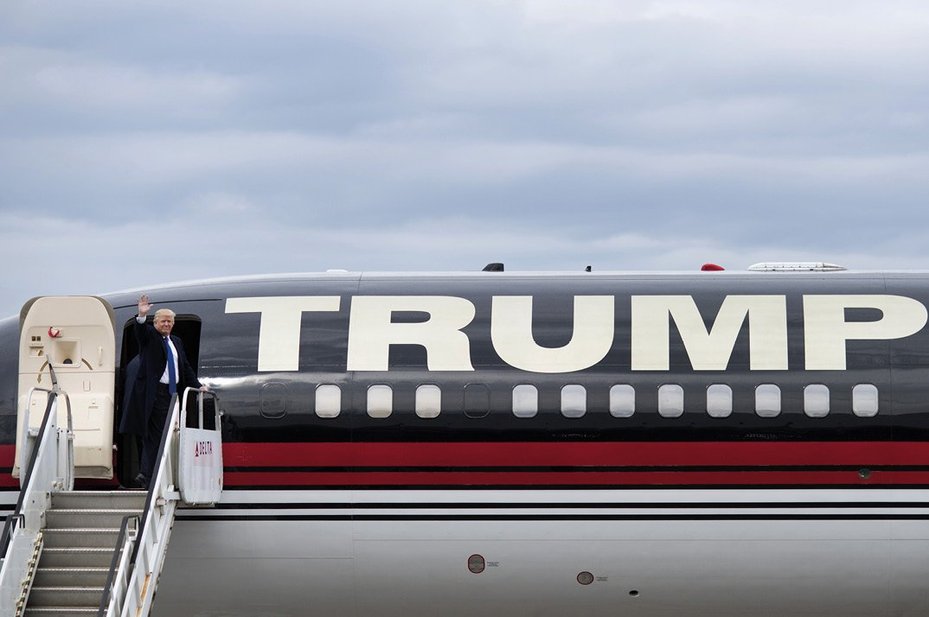
In 2008 Trump was reported in Russia's Seagull magazine as saying: "I have very good business relations with the Russians". Ty Wright / Bloomberg via Getty Images
Trump’s long history with Russia
Donald Trump’s connections to Russia have been the subject of intense scrutiny since he became President. The United States intelligence community has already concluded that the Russian government interfered in the 2016 election and “developed a clear preference for President-elect Donald Trump.”
Now, an investigation led by Special Counsel Robert Mueller is seeking to determine if any of Trump’s inner circle colluded with the Russians to make this happen. Recently, Mueller has broadened the focus of his investigation to include Russian purchases of, and investments in, Trump properties going back at least a decade.
The findings and outcome of those inquiries remain to be seen. But for now many suspect that Trump owes much of his success in business to his close ties to Russia, and by extension his current position as the president.
Trump’s links to Russia stretch back 30 years. In 1987, he first flew to Moscow to discuss a hotel project in Moscow. This deal never materialized, but Trump would try to make the Trump Tower Moscow project happen at least five more times in the years that followed, including a final attempt during his presidential campaign.
His first attempts took place during a time of great change in Russia. After the Soviet Union collapsed in 1991, President Boris Yeltsin abruptly shifted the country to a market economy. Vast state-held assets in oil, coal, mining and banking were snapped up by opportunists, many of whom later became known as the oligarchs.
When Vladimir Putin succeeded Yeltsin as president in 2000, he used the Russian intelligence services to force through a deal between the government and Russian mobsters and oligarchs. They could continue to operate freely as long as they helped consolidate his power base and serve his financial interests.
The result is a chain of events which created a massively wealthy elite class that spend vast sums of money internationally.
Seeing an opportunity, Donald Trump Jr. traveled to Russia six times in 18 months looking for investments, according to a 2008 statement he made at a real estate conference that was posted online by a trade publication and cited by the Chicago Tribune.
During that speech he acknowledged that he felt the presence of corruption, saying: “It is a question of who knows who, whose brother is paying off who … It really is a scary place.”
President Trump’s dealings with Russians may be catching up with him. In a revealing interview with the New York Times, the President was asked about the bounds and scope of Special Counsel Mueller’s investigation.
He responded: “… I mean, it’s possible there’s a condo or something, so, you know, I sell a lot of condo units, and somebody from Russia buys a condo, who knows?”
The Brokers and Intermediaries
Ventura Nogueira’s network mobilized a number of brokers and intermediaries, as well as a lawyer, to attract Russian and Eastern European investors, and to facilitate purchases at the TOC and other Panamanian developments. Some of these brokers traveled to Russia to attend high-profile real estate fairs to recruit buyers.
As detailed below, certain members of the Ventura Nogueira network have faced serious accusations of involvement in criminal activity. The network’s key members included the following:
Alexander Altshoul, who was listed as an officer in four Homes companies, is a Belorussian who lived in Canada before coming to Panama and working with Ventura Nogueira.
In Canada, Altshoul was closely connected to the Russian and Eastern European communities. He was twice identified as being involved in alleged real estate fraud in legal proceedings against other parties, although we are unaware of any charges being brought against him.
Altshoul “brought down a lot of Russians” to Panama, said Monte Friesner, adding that they “were investing left and right in Panama – that was very valuable.” According to Ventura Nogueira, Altshoul attended Trump’s party at Mar-a-Lago in January 2008.
As set out earlier in this report, Altshoul, together with Ventura Nogueira, emerged in November 2008 as a foreign representative of the DMG Group affiliated with David Murcia Guzmán.
Igor Anopolskiy’s involvement indicates the reach of the Ventura Nogueira network into powerful political circles internationally. Anopolskiy is a businessman from Ukraine and was listed as the Homes representative there.
He is recorded as a director or shareholder of at least 19 Panamanian companies linked to real estate, including four apparently relating to TOC units.
In his interview with NBC and Reuters, Ventura Nogueira confirmed Anopolskiy’s role in marketing TOC units in Ukraine.
Since 2005, Anopolskiy has been a shareholder in a travel agency in Ukraine whose previous shareholders include a woman named Oxana Marchenko. This is believed to be the wife of the former Ukrainian presidential chief of staff Viktor Medvedchuk, a vehement critic of the pro-European protests that led to the downfall of President Yanukovych.
Medvedchuk has close ties with the Kremlin and Vladimir Putin is the godfather to his and Marchenko's daughter. Medvedchuk was named in a Reuters report as having been in contact with Donald Trump’s presidential campaign team in 2016, a claim he denies.
Since March 2014, he has been sanctioned by the White House for threatening the peace and stability of Ukraine, and for undermining Ukraine’s democratic institutions and processes.
In September 2014, Anopolskiy was convicted in a Ukrainian court and sentenced to three years in prison for forging travel documents. The sentence was suspended and at the end of the suspension period, in June 2017, the sentence was purged.
Stanislav Kavalenka acted as the officer in three of the Homes companies. A man with the same name whom we believe to be the same person was charged in a Canadian court, along with three others, with a number of offenses, including economically benefiting from the forced prostitution of women.
He was barred from going near three Russian women described in court papers as victims. In May 2005, the case was withdrawn when two of the women failed to appear to give evidence against him.
Ventura Nogueira told NBC and Reuters that “later on, it was found out that [Kavalenka] had some problems in Canada with prostitution or things like that.”
Ventura said that he believed these problems had been resolved.
Boris Mikhailov was identified as a partner and sales manager at the Homes head office in Panama. An Israeli national of Eastern European descent, Mikhailov was also listed as an officer for a Homes company, as well as being an officer in nine separate shell companies affiliated with TOC units.
Boris Mikhailov’s mother acted as an officer in two shell companies created in the pre-construction period of the TOC. She was also the director of international sales at the Homes office in Canada.
According to Roger Khafif, Mikhailov and his mother attended both Trump’s Mar-a-Lago soirée in January 2008 and the TOC inauguration in Panama City in July 2011.
Juan Diego Araúz Arango, a Panamanian lawyer, is named as an officer of 73 SPVs apparently created by Homes for TOC purchases, more than any other Homes-connected individual Global Witness has traced.
In March 2015, Ventura Nogueira granted an interview to La Prensa, one of Panama’s largest newspapers, in which he alleged that Panamanian officials had been taking huge bribes for visas. Ventura Nogueira reportedly admitted to being involved in the scheme, and claimed that Araúz Arango had played a role in moving some of the proceeds.
Ventura Nogueira provided the newspaper with documents showing a transfer of $400,000, sent from his Turks and Caicos company, JN Overseas Investment Ltd., to a Panamanian company called Thunder International, of which Araúz Arango was then president, treasurer, secretary and a director.
The documents do not set out what the transfer was for. Global Witness has found no evidence to suggest any charges have been brought against Araúz Arango relating to this alleged scheme.
Ventura Nogueira had fled to the Dominican Republic by the time he gave his interview to La Prensa, having been arrested in Panama in May 2009 for an unrelated alleged fraud.
Gatekeepers to the international financial system
Company owners need service providers like lawyers, real estate brokers and accountants to help run their business. These professions are currently considered to be high risk by the Financial Action Task Force (FATF), the international anti-money laundering standard-setting body.
This is because the services they provide, such as forming companies and managing real estate deals, can constitute key stages in enabling money laundering. As a result, FATF now recommends that all such professionals carry out checks on their customers to ensure that they are not facilitating money laundering.
Global Witness is calling for all countries to make these checks mandatory.
More money laundering?
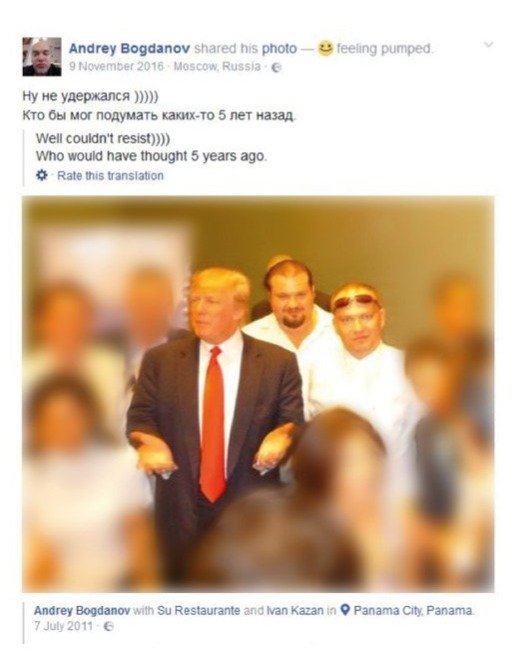
Trump poses for a photo at the TOC inauguration in 2011 next to Andrey Bogdanov and Ivan Kazanikov, aspects of whose background and activities in Panama strongly suggest connections with money laundering.Facebook
Beyond construction: the money laundering risks remain
This Global Witness investigation has largely focused on questions of money laundering surrounding the Trump Ocean Club’s pre-construction sales period. But there are strong indications that when this phase of the project closed, the opportunities for hiding dirty money remained open.
During the July 2011 TOC inauguration in Panama, Donald Trump posed for a photo next to two Russian men named Andrey Bogdanov and Ivan Kazanikov who subsequently bought at least six units in the TOC worth nearly $4.4 million. Aspects of the duo’s background and activities in Panama strongly suggest connections with money laundering.
Andrey Bogdanov’s career began with Russia’s Master-Bank soon after it was established in 1992. According to Bogdanov’s LinkedIn profile, he worked in the bank’s credit department.
A few years after Master-Bank’s founding, Bogdanov became a director and shareholder of a company called ZAO Makmar, alongside Master-Bank principal Boris Bulochnik.
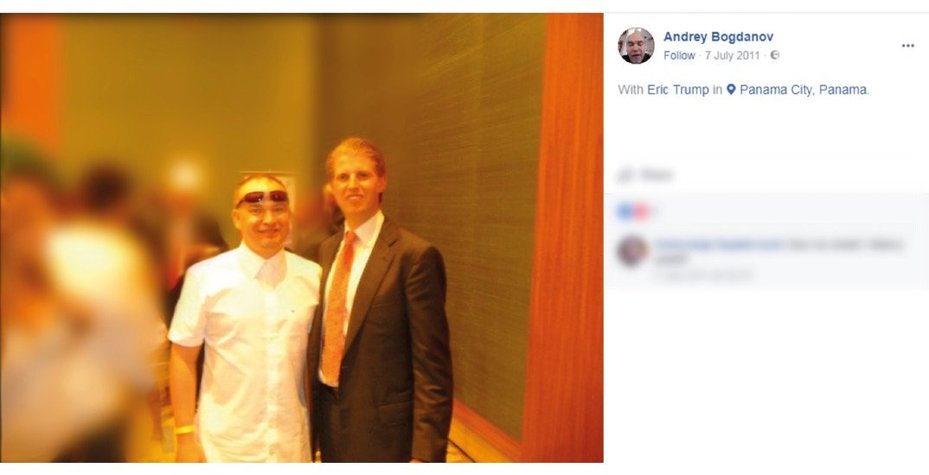
Andrey Bogdanov, pictured with Eric Trump, registered a company in Panama described by Monte Freisner as "a front – their business was moving money and only for Russians".Facebook
By 2013, Master-Bank had lost its license to operate, due to its failure to observe anti-money laundering laws, false accounting and loans to connected parties, though it continues to conduct private banking.
In 2015, a Russian criminal investigation was opened into allegations that directors of the bank, including Boris Bulochnik, had deliberately bankrupted Master-Bank.
Russian press has reported that Bulochnik had left Russia by this point, but that in 2016 the authorities arrested him “in absentia” with the intention of raising an Interpol notice.
Bogdanov, meanwhile, spent the early 2000s moving from country to country, arranging purchases of real estate, before arriving in Panama.
In 2009, he registered what purported to be a Panamanian internet advertising agency called Ads and PR – a company that appeared to do virtually no business, according to sources that worked in the same building in Panama.
Monte Friesner, who knew both Bogdanov and his business associate Ivan Kazanikov, told Global Witness that “Ads and PR was a front — their business was moving money and only for Russians.”
Friesner also claimed that “at one point they asked me to move money for them, they were talking about laundering money.”
Bogdanov and Kazanikov have been significant investors in the TOC project – Kazanikov bought “a good dozen” after bringing money into Panama to buy units, according to Friesner. Kazanikov told Global Witness that they bought units through Ventura Nogueira’s company: “Homes was the biggest company in Panama. We bought from Homes.”
One of their purchases entitled Kazanikov to a position on the TOC’s “committee of merchants”, where he has served for five years as the vice-president and, alongside a Trump representative, as a member of the management team.
In an interview with Global Witness, Kazanikov said that his and Bogdanov’s idea was to “manage investments for people in IT … to diversify patrimonies and invest in Panama.”
They “bought offices, restaurants and apartments” and the idea was to speculate and flip property investments during pre-construction, but they struggled, according to Kazanikov, due to the 2008 financial crisis.
Kazanikov claimed that they lost a lot of money, and says they still own property in the TOC.
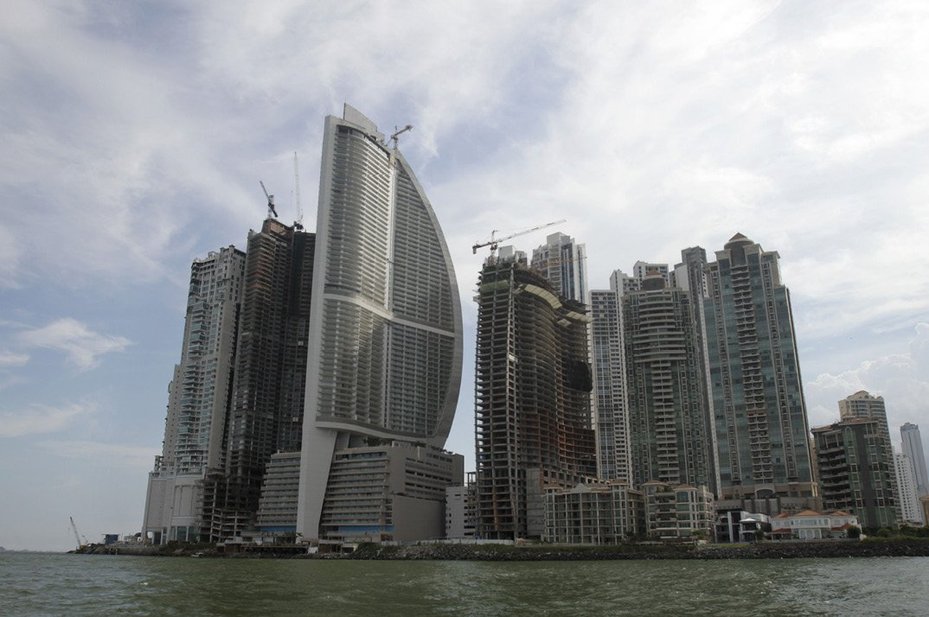
The Trump Ocean club featured many red flags that suggested money laundering. Many units were purchased in bulk. Some TOC buyers paid cash and a lot of them flipped their properties. Some purchases were made through secretive “bearer shares”. Arnulfo Franco / AP
Diligently ignorant
Many aspects of the Trump Ocean Club raised red flags suggesting money-laundering. These appear to have been ignored, or at the least overlooked.
Although there was no requirement in Panamanian or US law at that time that developers or licensors like Trump conduct due diligence on unit purchasers, any responsible business person in Trump’s position who wanted to prevent money laundering should have ensured such checks took place.
TOC developer Roger Khafif indicated that he did not do any checks on the source of the funds coming into the project because he believed others were responsible for that task.
He also said that he had not previously heard any allegations of organized crime laundering money through the TOC, that he did not profit from money laundering through the project, and that – to his knowledge – no money laundering occurred.
In his interview with NBC and Reuters, Ventura Nogueira denied any knowledge of his clients laundering money through their TOC purchases. He expressed the view that carrying out due diligence on customers was the project developer's responsibility, not his.
Regarding Trump, Ventura Nogueira said, “if he didn’t want to know that’s something else. I believe that he didn’t know.”
What Ventura Nogueira asserted emphatically was that neither Trump nor any of the other parties involved in the TOC asked him questions about where the money was coming from.
My sentence was going to end in 2004, but [I] was released in 1998 … I was the wolf who kept the fox away from chicken coups – it takes a thief to catch a thief!
The extent to which Donald Trump had knowledge regarding the TOC buyers is not clear. However, public documents on a comparable Trump project, in the Dominican Republic, suggest that the Trump Organization likely had audit rights, as well as the right to receive sales reports and to demand information on the TOC buyers.
Sales during the pre-construction period at the TOC presented a series of indicators of financial crime.
This Global Witness investigation shows that at least 139 Panamanian special purpose vehicles were created during the TOC’s pre-construction period to facilitate the sale of its units. These were all shell companies that had names that followed a formula that included a TOC unit number.
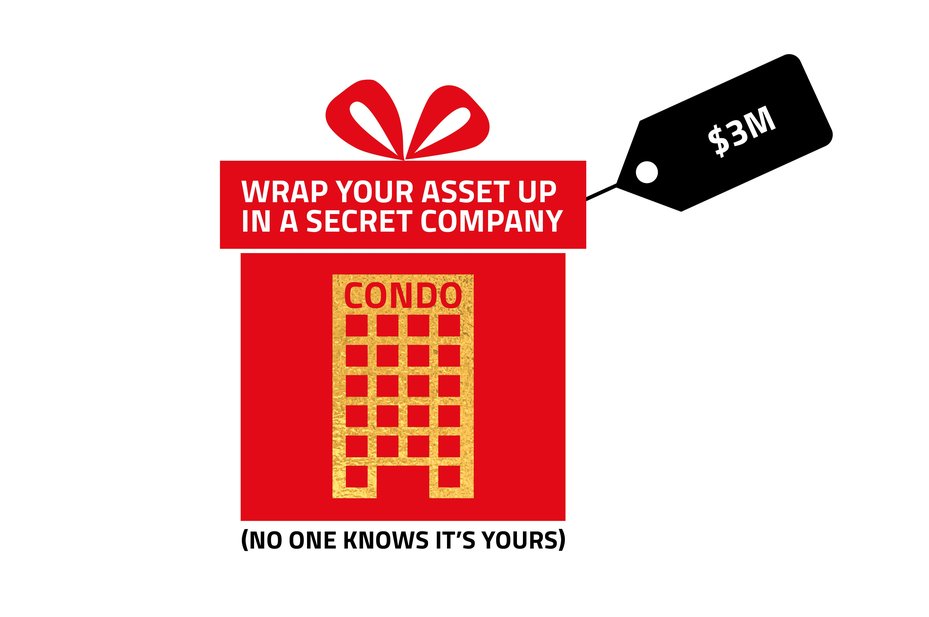
Global Witness
It seems the intention was for purchasers to use the companies to buy the numbered properties in question and potentially make other purchases as well.
Each of these companies was anonymously-owned, with nominees listed on the paperwork. This meant it would be nearly impossible to determine the companies’ ultimate owners and their sources of funding.
There were a range of additional warning signs that appear to have been ignored. Many units were purchased in bulk, according to individuals directly involved in TOC deals. Some TOC buyers paid cash and a lot of them flipped their properties.
Sources interviewed by Global Witness, as well as Ventura Nogueira in his interview with NBC and Reuters, described how some purchases were made through secretive “bearer shares”.
Using anonymous shell companies to launder money through real estate
In order for the criminal and corrupt to enjoy their ill-gotten gains, they need to integrate the money into the legitimate financial system, while disguising the origin of the funds.
This is ideally done through investment in an industry with weak anti-money laundering laws, meaning one where few or no questions are asked about where the money comes from.
Buying luxury real estate is a favorite way for fraudsters to move dirty money – and is a particularly attractive proposition when it can be done by hiding behind a shell company.
Organized crime groups regularly use anonymously-owned companies to launder their profits, sometimes setting up a series of firms that own each other. These companies are stacked up like Russian dolls, often crossing borders, making it almost impossible for law enforcement to track down the real human beings behind the money.
An anonymous company can do business like any other company; the only difference is how difficult it is to find out who controls it. It can be owned by a "nominee" – someone who essentially rents out their name so that the real owner’s identity can be kept hidden – or just by another company that can also have anonymous owners.
Global Witness has repeatedly shown how all types of criminals, including traffickers of drugs, arms and people, as well as terrorists, corrupt politicians and tax evaders, are able to cover their tracks in this way.
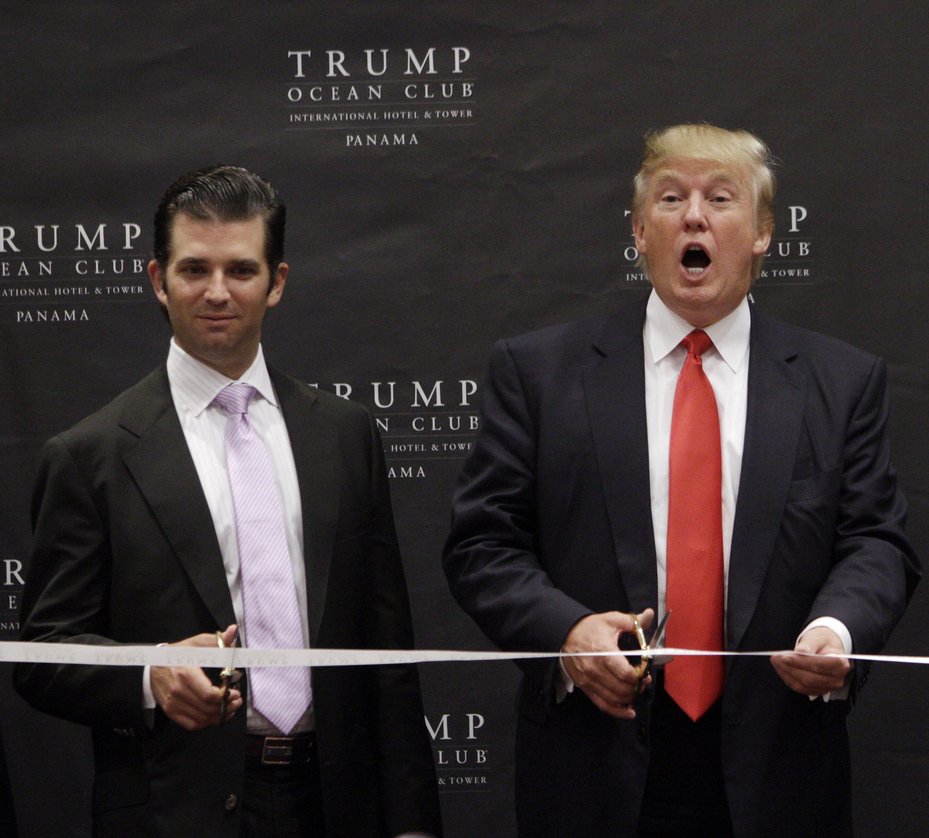
The Trumps were voted out as administrators of the TOC condo units in 2011 on the basis of alleged financial misconduct which they denied, and they counter-claimed. The dispute was reportedly settled. Arnulfo Franco / AP Photo
Bearer shares 101
Bearer shares are unregistered stock certificates or equity security that belong to whoever holds them at the time. Issuers of bearer shares do not list the owner’s name or track the transfer of ownership.
Therefore, the use of bearer shares allows ownership of a firm and with it the asset it owns, like a luxury condo, to be transferred in total anonymity, without any record of the transfer.
Because of the high potential for fraud and money laundering, bearer share deals have been long banned in most countries and their use has been restricted even in Panama since 2015.
Conclusion
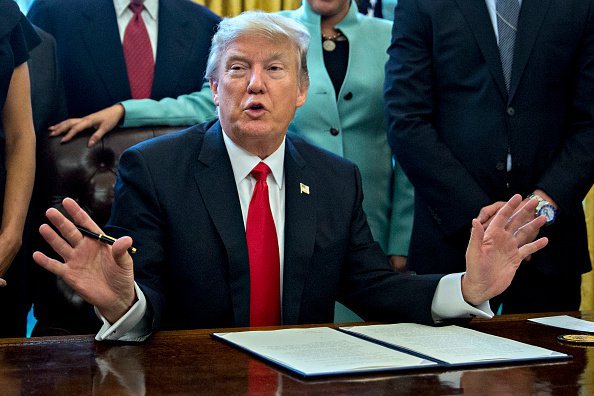
If President Trump wants to ‘drain the swamp’ he should start in his own backyard. Andrew Harrer-Pool / Getty Images
When musing on whether he would run for President of the United States, Donald Trump told Rolling Stone magazine: “I'm running for office in a country that's essentially bankrupt, and it needs a successful businessman, and, by the way, let me explain about one thing, might as well get that clear: I never went bankrupt.”
This statement didn’t contain "fake news" but it did contain two half-truths. Firstly, while Donald Trump the man has never filed for bankruptcy, many of his businesses have; in the early 1990s and again in 2004 and 2009.
He appears to have learned something from this because subsequently he largely ceased to invest his own money in new real estate developments.
This leads to the second half-truth; that he is a successful businessman.
Trump has undoubtedly amassed a large fortune, but the way in which he has gone about it deviates sharply from a legitimate business model.
Trump’s business approach has been to lease his name and for him and his family to drum up sales in some of the world’s dirty money hotspots, in some instances aided – knowingly or unwittingly – by networks of money launderers.
The result is that Trump’s current wealth has depended in part on securing significant infusions of untraceable foreign funds.
In the case of the Trump Ocean Club, the identities of many of the early real buyers of the condos and other units, and the source of their funds, have been hidden by the use of anonymously-owned shell companies.
This report has shown how some buyers purchased units in the TOC to launder money, but it has not been possible to identify the owners of most of the units or the source of the funds that purchased them.
We do not know what proportion of these funds derived from legitimate or criminal sources. More importantly, Donald Trump doesn’t know either.
The Trump Organization evidently keeps close tabs on sales to ensure they get their agreed cut, but it seems they take equal care to ignore where the money comes from.
When questioned about the criminal links to their projects, the Trump Organization has often claimed that they are merely a licensee and that the developers bear responsibility; or that they have done their due diligence, without disclosing what this entailed.
If the Trump Organization has been undertaking due diligence, it seems to have been of a consistently low standard.
Speaking about his idea to build a wall on the U.S. border with Mexico in August 2017, Donald Trump said: “The drugs are pouring in at levels like nobody has ever seen … We’ll be able to stop them once the wall is up.”
This was the same man whose first international licensing deal, the TOC, substantially benefited from the operations of criminal or shadowy characters, one of whom was a notorious launderer of drug money.
This case is emblematic of the risks posed by a real estate industry that asks few questions and deliberately avoids knowing too much about its customers.
If President Trump wants to “drain the swamp” he should start in his own backyard. If he cannot do that there is little reason to believe he will make good on that central pledge of his election campaign.
The Trump Ocean Club today
In 2011, the Trumps were voted out as administrators of the TOC condo units by the owners’ Board of Directors on the basis of alleged financial misconduct, following an acrimonious dispute.
Trump responded by suing residents with a confidential claim for as much as $75 million for wrongful firing, alleging a criminal conspiracy.
According to a Washington Post article published in January 2017, the dispute ended in a confidential settlement.
Today the Trumps reportedly continue to manage the hotel, even after the majority of the hotel condo units were sold for $23.7 million, in July 2017, to Ithaca Capital Partners.
Recommendations
Every country should ensure that it has in place effective international money laundering controls, including, as a minimum, meeting the international anti-money laundering standards set out by the Financial Action Task Force (FATF).
More specifically:
Recommendation 1: Appropriate law enforcement authorities, including Special Counsel Robert Mueller, should investigate these allegations and, if appropriate, hold President Trump accountable for his actions. The congressional committees looking into this issue should likewise investigate these allegations and, if appropriate, hold President Trump accountable for his actions.
Following his organization’s various bankruptcies, at least a part of Trump’s business empire has been built on untraceable funds, some apparently linked to Russian criminal networks.
This is particularly concerning because of the well-documented relationship between Russian organized crime groups and the Russian state.
It raises serious questions about whether Trump’s dependence on Russian money in fact makes him beholden to foreign interests.
Recommendation 2: Every country should require all companies and trusts to disclose who ultimately owns and controls them and make this information public.
As shown by the real estate developments examined in this report, anonymously-owned companies can be used to facilitate drug trafficking and money laundering.
Ending the ability to set up an anonymous company or trust would make it much harder for criminals to hide behind companies to further their criminal activities, and would help protect people harmed by them.
Global momentum to stop anonymously-owned companies is growing.
In 2013, all G8 countries, including the US, endorsed broad principles regarding company ownership disclosure and agreed to take steps to tackle the problem.
In 2014, the G20 signed up to new high-level principles on company ownership transparency that build upon the current international standard, as set by FATF.
The European Union has required all member states to create beneficial ownership registries for companies incorporated in their jurisdictions.
It is currently considering whether to strengthen this requirement by making this information public, something which some countries are already doing.
The United States, where many of the world’s anonymous companies are created, should be leading on company ownership transparency, not trailing behind as it currently is.
There is long-standing bipartisan support for legislation in Congress that would be an important first step toward tackling this problem.
Such legislation would require US companies to disclose their beneficial owners to the government when they are created, keep that information up to date, and make that information available to law enforcement and other stakeholders.
Congress must pass legislation to increase beneficial ownership transparency to stop criminals from hiding behind US companies to harm innocent people, steal from businesses and rip off the government.
In Panama, legislation passed in 2015 requires resident agents (those who form and represent companies and other legal entities) to identify, verify and retain information about the identity of final beneficiaries holding 25% or more of the shares of the legal entities they represent, and make that information available upon request by the authorities.
Additionally, companies must maintain a share register for the owners of nominal shares of those companies.
However, the companies themselves are not required to disclose their ownership information directly to the government or to the general public. This makes it significantly more difficult for law enforcement to access this information.
Panama should expand its requirements to ensure that beneficial owners of Panamanian companies are disclosed via a public register in a timely manner.
Recommendation 3: Every country should require the real estate sector to know who their clients are and the source of their funds as a precaution to make sure that dirty money isn’t being laundered into the property market.
It is all too easy for bad actors to use real estate purchases as a vehicle for money laundering. High-end real estate purchases are prone to money laundering risks, according to FATF and the U.S. Treasury.
FATF has issued global guidance for countries on how to adopt measures that would ensure real estate professionals and others who are involved in real estate transactions are conducting anti-money laundering due diligence properly.
However, many countries have yet to meet this standard in full and the real estate industry has largely resisted efforts to be regulated for money laundering.
Globally, the real estate sector should be required to do anti-money laundering checks on their clients, similar to the banking sector, and to turn away the business if the funds are suspect.
In the United States, this is a change that must happen and that does not require new legislation. In 2001, “persons involved in real estate closings and settlements” were required to establish anti-money laundering programs.
However, for the last 15 years the Treasury Department has “temporarily” exempted them from having to do this.
The Treasury Department should initiate a rulemaking to require the real estate sector to perform anti-money laundering checks on clients.
As a part of this rule, the Treasury Department should also require the disclosure of the beneficial owners who ultimately own companies purchasing real estate throughout the US.
In Panama, the law was recently amended to require individuals involved in real estate transactions – specifically, realtors, real estate companies, developers and lawyers – to conduct Know Your Customer due diligence when facilitating real estate transactions on their clients’ behalf.
This includes identifying the ultimate beneficial owner of companies used to purchase real estate.
However, these measures are relatively new and it will take time to ensure both regulators and regulator entities are adequately enforcing and implementing these new rules.
Recommendation 4: Every country should require lawyers who carry out transactions for their clients, including the buying and selling of real estate and the creation of companies, to know who their clients are and the source of their funds.
A number of high-profile corruption and money laundering scandals – including the case of Teodorin Obiang, son of the president of Equatorial Guinea, the alleged embezzlement of $4.5 billion from 1 Malaysian Development Berhad (1MDB), a sovereign wealth fund, and Global Witness’ own investigation in New York, profiled on 60 Minutes – have highlighted the role that legal professionals could play in facilitating the movement of suspect funds.
This is a significant vulnerability throughout the global financial system, which is why FATF recommends that lawyers who carry out transactions for their clients in a number of areas – including buying and selling real estate, creating and managing companies and managing money for their clients – should be required by law to carry out anti-money laundering checks.
The United States should pass a law that requires transactional lawyers to have customer due diligence and record keeping requirements.
The law must specify what due diligence lawyers have to carry out before accepting a client, require lawyers to identify higher risk clients and require them to report suspicious transactions to the authorities.
These are specified by the international anti-money laundering standards set by FATF, of which the U.S. is a founding member.
The US has not implemented these international standards in large part due to sustained lobbying from the legal profession.
In Panama, lawyers acting either as agents forming companies or representing a client in a real estate transaction are now required to conduct due diligence and a range of anti-money laundering checks.
These include collecting beneficial ownership information about any companies involved in these proceedings and reporting suspicious activities to relevant authorities.
However, concerns remain about compliance with and enforcement of these new standards.
Resource Library
Narco-a-lago: Money Laundering at the Trump Ocean Club Panama
Download Resource